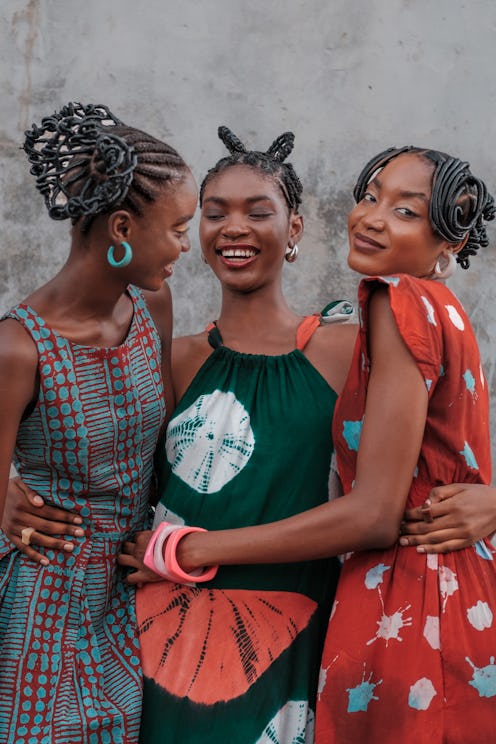(Designers)
Busayo Olupona Wants Her Clothes To Bring You Joy
We’d say mission accomplished.

I’ve been working in fashion long enough to become familiar with a certain type of corporate climber-turned-brand founder origin story: 9-to-5er realizes that cute conservative wardrobe options out there for women are few and far between. They launch something focused on elevated workwear you actually want to wear, end up leaving their position to grow the company, and, well, the rest is history. But while Busayo Olupona began building her self-named brand while working at a white-shoe law firm (and test-driving a few designs at work), mere elevated office basics were never her end game. Her vibrant designs, all handmade using a traditional Yoruba dyeing technique in Nigeria, resonate specifically because they are too bold and special to fit within a buttoned-up code.
A cheeky mini skirt and crop top set covered in a splashy sunburst tie-dye pattern. Long breezy maxis in geometric prints. Swishy tulle skirts with silk panels. These are just a few of the arresting creations to recently come out of Busayo — which, as it turns a corner on just over a decade in the industry, is beginning to explore new techniques and silhouettes beyond the vivid dresses that put it on the map.
“So I think in the beginning, I was really dressing myself,” Olupona tells me over a Zoom call. Raised both in Nigeria and California, she’s a self-proclaimed fan of a flowy and color-soaked West Coast aesthetic. Now as she stands on a bigger platform in the fashion world (her offerings are currently sold at heavy hitters like Moda Operandi, Neiman Marcus, and Bergdorf Goodman), she’s starting to think about outfitting all types of women in a way that feels true to her label’s free-spirited ethos. “I am not always the customer… I’m in constant conversation about ‘Who is the Busayo woman? What does she want? Where is she going?’”
The answer to this ranges from Gwyneth Paltrow to Madonna to Lupita Nyong’o, all of whom have worn Busayo pieces over the last few years. This level of success, however, was hard-won. When Olupona first decided to take the clothes she had been making for fun and personal fulfillment during trips to her family’s home in Nigeria, she had no resources beyond 40 samples and a friend of a friend lending her a space for a pop-up.
“I did all the things you’re not supposed to do at the beginning,” Olupona tells me with a laugh, before sharing how an ill-advised and expensive trip to the 2013 Magic trade show in Las Vegas did pay off in one way: She met her mentor Mercedes Gonzalez, who taught her the ins-and-outs of properly launching a new venture. And although around this time “money was completely flying out the window,” her designs were starting to attract some serious attention. Actor Adepero Oduye wore Busayo pieces early on; a few years later, she recommended the collection to her 12 Years A Slave co-star Nyong’o, who has become one of the label’s longstanding clients.
“[Busayo] really is a brand that Black women helped build,” notes Olupona with pride. Still, she says, positive feedback and a supportive community are not always enough to keep a fledging business afloat. By 2015, she made the tough decision to return to the world of law to finance the many demands of her passion project — this time, however, she landed a position at the New York City Economic Development Corporation, where she advised on the financial growth of the city’s fashion industry. It wasn’t exactly her dream job, but a fulfilling way to make money while focusing on her side hustle. “This part of the story can be boring, I also think it's important for people to know how that it's not just that all of a sudden a brand shows up and they're huge,” she tells me. “It happens, but it's so rare.”
In 2020, however, Olupona caught a major break — interest from Saks Fifth Avenue via the RAISEfashion mentorship program, which connects BIPOC entrepreneurs with industry advisors who can both offer valuable insights and opportunities to succeed. And after laying the groundwork for eight years, she was more than ready to step through that door when it opened. A fruitful meeting with Saks turned into a productive call with Shopbop and, as Olupona puts it, they “really began to grow from there.” (Both retailers still carry the line.)
Running a successful fashion business, of course, never stops being hustle — you are only as good as your last collection. That said, as I chat with Olupona, she speaks with great zeal about the momentum building around her efforts. This enthusiasm is evident in her latest designs. She just returned from a trip to Nigeria, where she spends several weeks a few times a year working with local artisans on her next collection for fall. This season, they’ve been experimenting with Japanese dying techniques, denim manipulation, and shirting made from different fabric panels.
“Going home is what makes me come alive, and what makes the work interesting and valuable,” Olupona tells me, explaining that while she knows that beautifully made clothing won’t save the world, it does have the power to change the way we carry ourselves as we move through it. And that, in and of itself, is something quite meaningful to dedicate one’s time to. “I don't think that we really think deeply enough about the emotional impact of fashion,” she says with a smile. “It's an art form where you can transform how you present to the world on a daily basis. Every single day, we have the opportunity to re-create ourselves in how we dress — how cool is that?”